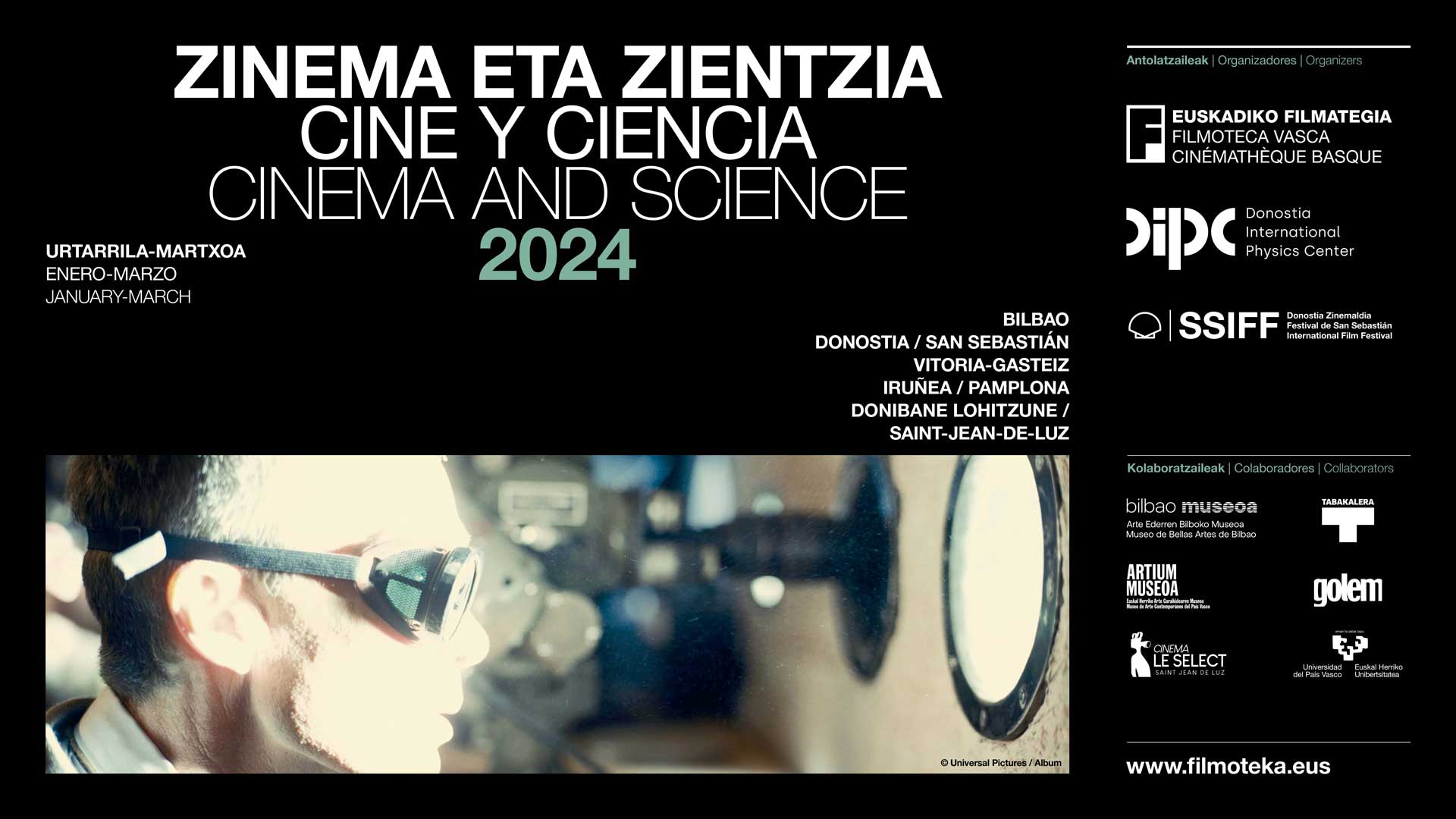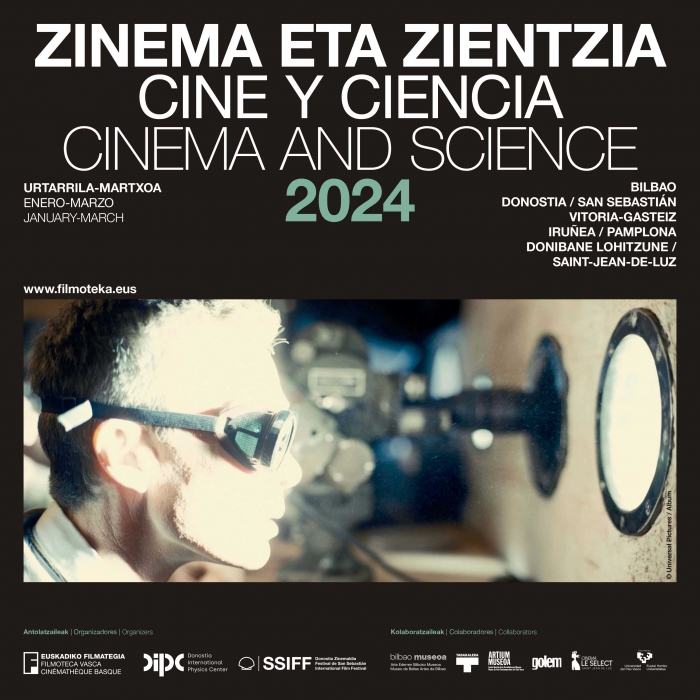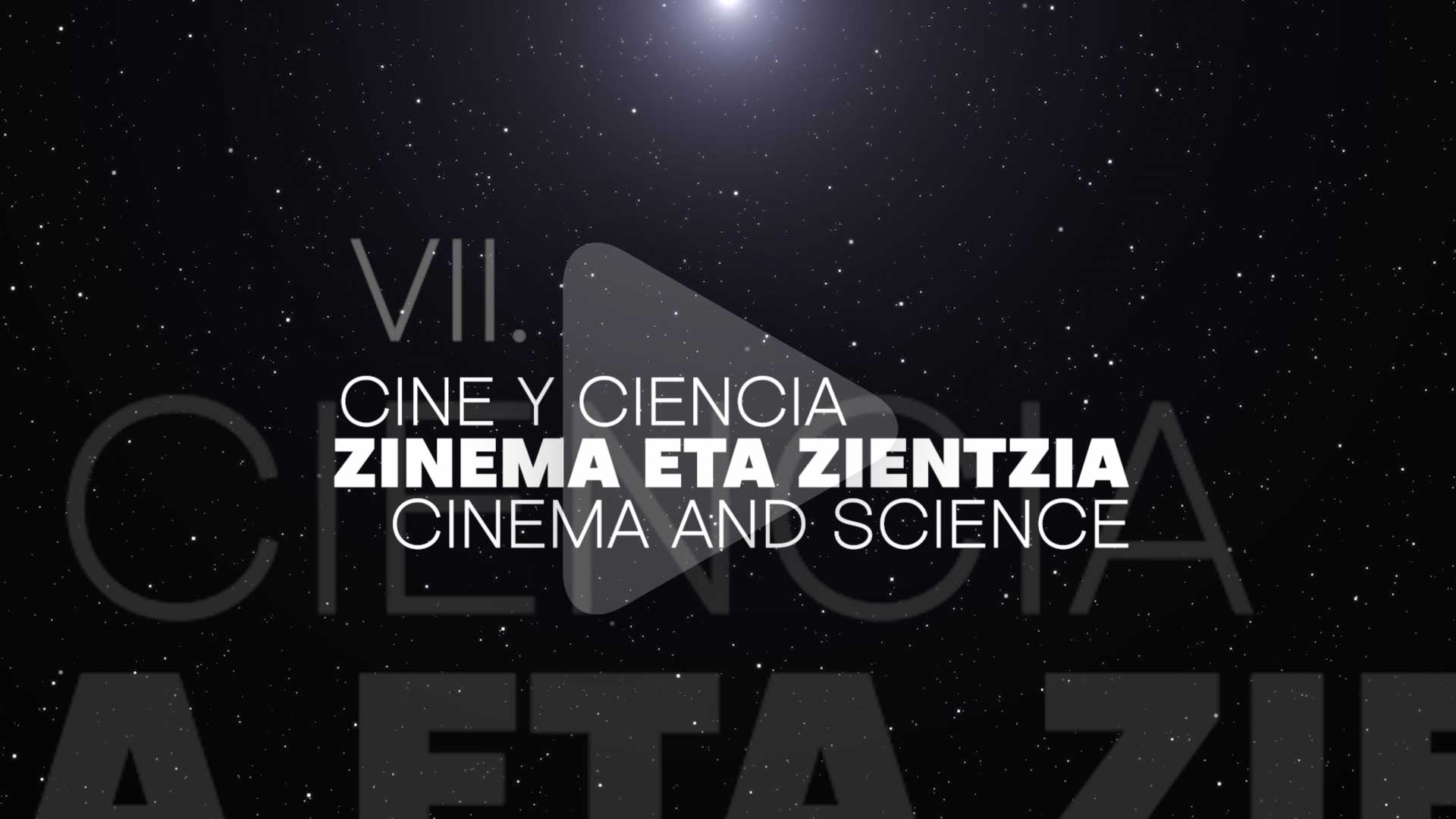The seventh edition of the Cinema and Science season will take a closer look at the greatest scientific dilemmas through ten films to screen from January to March in Vitoria (Artium Museoa), San Sebastian (Tabakalera International Centre for Contemporary Culture), Bilbao (Bizkaia Aretoa-Sala Mitxelena, University of the Basque Country), Pamplona (Cines Golem Baiona) and Saint Jean de Luz (Cinéma Le Sélect). The audience will also have the opportunity to engage in discussion with some twenty scientists of international prestige on subjects including the atomic bomb, AI and ageing of the population.
Participants in the press conference held today in San Sebastian were Joxean Fernández (Director of the Filmoteca Vasca), Ricardo Díez Muiño (Director of the Donostia International Physics Center), Edurne Ormazabal (General Director of Tabakalera), Bingen Zupiria (Basque Government Counselor of Culture and Language Policy) and Jokin Bildarratz (Basque Government Counselor of Education). Also present were Miguel Zugaza (Director of the Museo de Bellas Artes de Bilbao), José Luis Rebordinos (Director of the San Sebastian Festival) and Beatriz Herráez (Director of the Artium Museoa).

Organised by the Filmoteca Vasca, the Donostia International Physics Center (DIPC) and the San Sebastian Festival, the season aims to transmit the culture of film and science. In the words of Joxean Fernández, at this seventh edition the discussions will largely focus on “the dilemmas and struggles” experienced by the different scientific communities “in very precise historical and geographical contexts”. Names such as those of Robert Oppenheimer, Hedy Lamarr and Ignaz Semmelweis, among others, will feature in a season combining classic, contemporary, fiction, non fiction and animated films, where the selection criteria is always cinematic quality combined with possibility of being able to understand the films from a scientific point of view”, he stressed.
For his part, Díez Muiño emphasized the popularity of this season. “Which only continues to increase. In a year when the fascinating life of the physicist Robert Oppenheimer has shown on screens all over the world, we want to demonstrate how dialogue between the cinema and science can be approached from different points of view and how all are attractive and enriching. This season highlights the complexity and beauty of the relationship between two activities as creative as the cinema and science”, he added.
According to Counselor Zupiria, this season is the result of collaboration between different bodies: “We can say that within our cultural ecosystem the collaboration between institutions is an added value and a factor deeply rooted in the way we work. This collaboration spawns myriad interesting projects responsible for generating new values and knowledge, including this season we present here today. This, or rather these gatherings related to science and the cinema, enable us to satisfy our curiosity or may perhaps, who knows, encourage us to show greater curiosity”.
Finally, the Counselor of Education, Jokin Bildarratz, stressed that this season fully coincides with the core objectives of the Department of Education, and precisely the communication of scientific knowledge. Here he referred to a number of initiatives annually promoted by the Ministry to spread scientific knowledge and present the work conducted by scientists, such as the Passion for Knowledge festival and the Naukas, Ciencia Show, Zientzia Kalean and Zientzia Ikasgelan programmes. “It is obvious that the Science and Cinema season has the same purpose: to make knowledge of science attractive to all”, he said.

Films
The season will kick off on Thursday 11 January with the screening in Vitoria and San Sebastian of Oppenheimer (Christopher Nolan, 2023), a movie explaining how the atomic bomb was created and the dilemma entailed by the discovery. The film will be introduced in Tabakalera (11 January), in Bilbao (13 January) and in Pamplona (16 January) by the physicist Pedro Miguel Etxenike, president of the DIPC and a great expert on the life and work of the North American physicist Robert Oppenheimer. For this unique event, professor Etxenike will give a pre-film talk (at 18:00), while the screenings will run at their usual time (19:00).
Semmelweis (André de Toth, 1940) follows the figure of Ignaz Semmelweis, a pioneering doctor in antiseptic procedures and who clashed with the medical community of the mid 19th century on endeavouring to save the lives of the many women who were dying after giving birth. Plan 75 (Chie Hayakawa, 2022), which screened at Cannes two years ago, raises the issue of our ageing society; while Bombshell: The Hedy Lamarr Story (Alexandra Dean, 2017) looks back at the history of this classical Hollywood actress whose research work was relegated to the shadows, despite being a forerunner of long-distance wireless communications.
Accompanying these will be two classics starring some of the biggest names in the history of the cinema: Out of Africa (Sydney Pollack, 1985), in which Meryl Streep and Robert Redford show us the magnificence of the wild; and Bringing Up Baby (Howard Hawks, 1938), a delightful comedy featuring Katharine Hepburn and Cary Grant.
In 1986, Vicente Aranda took to the big screen Tiempo de silencio, the classic work on the author and doctor Luis Martín-Santos, in this year 2024 celebrating the 100th anniversary of his birth. The Perfect Storm (Wolfgang Petersen, 2000) will provide the pretext for talking about the climate, while the animated movie Mars Express (Jérémie Périn, 2023) will do the same for artificial intelligence. This subject is also addressed in the movie closing this edition of the Cinema and Science season, signed by the German filmmaker Werner Herzog: Theater of Thought (2022).
The programme will screen in full in San Sebastian, Bilbao, Vitoria and Pamplona, while viewers in Saint Jean de Luz will have the opportunity to watch La vie du Dr. Semmelweis, Out of Africa, Mars Express, L’Imposible Mr. Bébé and Oppenheimer.
The films will be introduced by: Javier Aizpurua (physicist from the DIPC and Ikerbasque), Itziar Alkorta (biochemist from the University of the Basque Country-UPV/EHU), Amaia Bernaras (computer engineer from the Basque Technology Park), Igor Campillo (physicist from Euskampus and the DIPC), Fernando Cossío (chemist from the UPV/EHU and Ikerbasque), Pedro Miguel Etxenike (physicist from the DIPC and the UPV/EHU), Aitzol García Etxarri (physicist from the DIPC and Ikerbasque), Maia Garcia-Vergniory (physicist from the DIPC and the Max Planck Institute for Chemical Physics of Solids), Miguel Ángel Goenaga (doctor from Donostia University Hospital), Mari Luz Guenaga (computer engineer from Deusto University), Ane Insausti (telecommunications engineer from the Fundación Mubil-Gipuzkoa Provincial Council), Ignacio López-Goñi (microbiologist from the UNAV), Maialen Martija (physicist from Euskalmet/Tecnalia), Idoia Mujika (chemist from the Materials Physics Center CFM CSIC-UPV/EHU), Juan Ignacio Pérez Iglesias (biologist from the UPV/EHU and the DIPC), Onintze Salazar (physicist from Euskalmet/Tecnalia), Itziar Vergara (doctor from the IIS Biogipuzkoa), Rafael Yuste (neurobiologist from Columbia University), Didier Roux (physicist and chemist from l’Académie des Sciences et des Technologies) and Ricardo Díez Muiño (physicist from the DIPC and Ikerbasque).
Other Activities
Finally, the morning screenings for schools will run in San Sebastian, Bilbao and Vitoria, with the screening of Mars Express (Jérémie Périn, 2023), subtitled into Basque and introduced by Rodrigo Agerri and Izaskun Etxeberria from the Hitz research group at the University of the Basque Country.
Tickets can be purchased from the websites and ticket offices of Tabakalera, Artium Museoa, the Museo de Bellas Artes de Bilbao (whose screenings will take place in the Bizkaia Aretoa due to the work underway at the museum) and of the Le Sélect and Golem-Baiona cinemas. Ticket prices vary from €3.50 to €6 (not including concessions). Further information can be found on www.filmoteka.eus.







